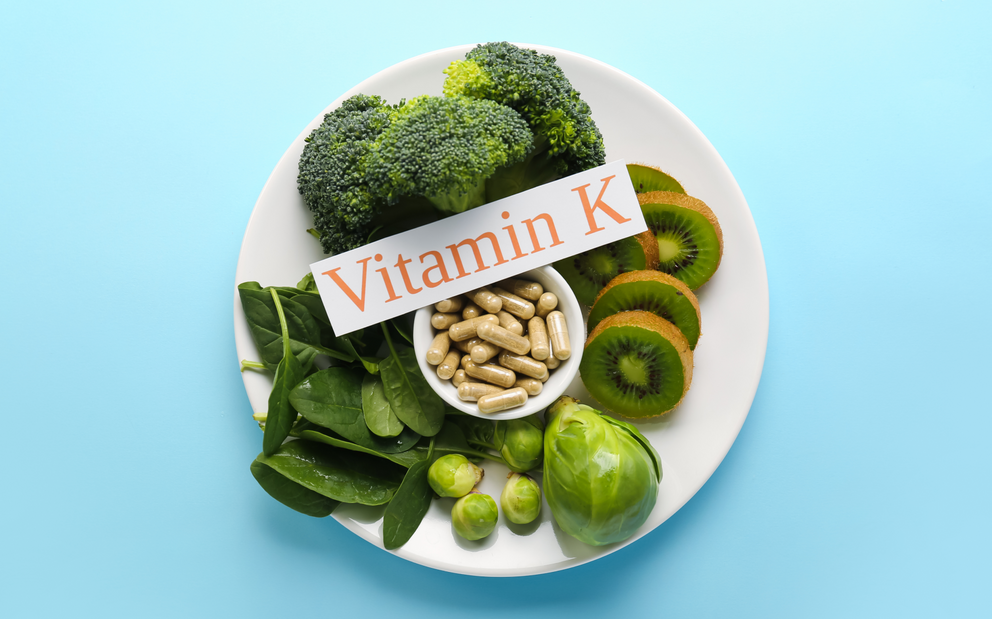Using the best form of Vitamin K: vitamin K1 vs MK-7
Table of contents

Vitamin K is an essential nutrient that plays a vital role in blood clotting and bone health. It exists in two primary forms: vitamin K1 (phylloquinone) and vitamin K2 (menaquinones). While vitamin K1 is primarily found in leafy green vegetables, vitamin K2 is found in fermented foods and animal products. Among the various forms of vitamin K2, menaquinone-7 (MK-7) has gained particular attention for its unique properties and potential health benefits. In this article, we will delve into the differences between vitamin K1 and MK-7, evaluate their respective roles in osteoporosis prevention, and discuss the importance of these nutrients for overall health.
What forms of vitamin K are there?
In supplements, vitamin K generally comes in the following forms:
- Vitamin K1
- Vitamin K2
- Menaquinone-4 (MK-4)
- Menaquinone-7 (MK-7)
What is the Difference between Vitamin K1 and MK-7?
Vitamin K1 (Phylloquinone)
Vitamin K1, also known as phylloquinone, is the most abundant form of vitamin K in the human diet. It is primarily found in green leafy vegetables, such as spinach, kale, and broccoli. Vitamin K1 plays a crucial role in the coagulation process, helping to form blood clots and preventing excessive bleeding1. The liver utilises vitamin K1 to synthesise proteins involved in blood clotting, such as prothrombin and factors VII, IX, and X2.
Vitamin K2 (Menaquinones)
Vitamin K2, also referred to as menaquinones, is a group of compounds primarily found in fermented foods and animal products, such as cheese, natto (a Japanese fermented soybean dish), and organ meats. Among the various forms of menaquinones, MK-7 has gained significant attention due to its potential health benefits and bioavailability3. In contrast to vitamin K1, which primarily supports blood clotting, MK-7 has been shown to play a more prominent role in bone health and cardiovascular health4.
Therefore, Vitamin K1 is not very bioavailable, MK-4 and MK-7 are forms of vitamin K2, which resembles the form of vitamin K that’s present in your body.
Why is vitamin K in MK-7 form better?
Your body can use any form of menaquinone with roughly the same bioavailability. The only tricky part is making sure that the vitamin K you eat is easy to convert to MK-4, which is the specific form that menaquinone takes in the body.
A study was conducted to determine the bioavailability of MK-4 and MK-7. This research found that MK-4 does not increase your tissue levels of menaquinone, but MK-7 increases your tissue levels of menaquinone in the body at nearly a 1:1 ratio. Therefore, MK-7 is a much better supplier of MK-4 than MK-4 is itself, and since all that’s necessary to change MK-7 into MK-4 is knocking off a few chains, your body can convert MK-7 into bioavailable menaquinone almost effortlessly.
Research has also been done into MK molecules with even longer chains, and it’s possible that MK-9 may have even better bioavailability than MK-7. At this stage, however, MK-7 is the most stable and bioavailable form of vitamin K on the market, and it lacks the side effects associated with vitamin K1.
Vitamin K is necessary for coagulation, and it interacts with a variety of internal organs. Overloading the body with vitamin K1 or making this vitamin hard to process could lead to dangerous bodily imbalances, and taking the most bioavailable form of vitamin K, MK-7, helps your body perform its vital functions smoothly.
Why do we use vitamin K MK-7 instead of other forms?
Vitamin K is a finicky essential nutrient. If the levels of vitamin K in your body aren’t exactly right, you might experience coagulation issues. Vitamin K1, however, throws your body out of whack with its poor bioavailability. As we researched the ingredients that would go into our Feel Multivitamin™, switching to MK-7 was an obvious choice. As we learn more about vitamin K and the best way to deliver it in your body, count on your daily Feel Multivitamin™ to evolve in tandem with the latest industry trends.
The Role of Vitamin K in Bone Health
Both vitamin K1 and vitamin K2 play essential roles in maintaining bone health. They aid in the activation of osteocalcin, a protein responsible for binding calcium to the bone matrix5. This process is crucial for maintaining bone strength and preventing conditions such as osteoporosis.
Vitamin K1 and Bone Health
Several studies have investigated the relationship between vitamin K1 and bone health. A meta-analysis of 13 studies found that higher vitamin K1 intake was associated with a reduced risk of fractures6. However, the results have been mixed, and some research has suggested that vitamin K1 may not be as effective as vitamin K2 in improving bone health7.
Vitamin K2 (MK-7) and Bone Health
Compared to vitamin K1, MK-7 has demonstrated more potent effects on bone health. A study conducted in postmenopausal women found that supplementation with MK-7 significantly improved bone mineral density and bone strength, leading to a decreased risk of osteoporosis8. Moreover, MK-7 has a longer half-life than vitamin K1, allowing for more efficient utilisation by the body9.
The Optimal Form of Vitamin K for Osteoporosis Prevention
While both vitamin K1 and MK-7 have demonstrated benefits for bone health, the current body of evidence suggests that MK-7 may be more effective in preventing osteoporosis. A comprehensive review of the literature concluded that vitamin K2, particularly MK-7, has a more significant effect on bone metabolism and fracture risk than vitamin Kt is important to note that a combination of both vitamin K1 and MK-7 may provide the most comprehensive protection against osteoporosis, as each form of vitamin K plays a unique role in bone health.
What is the Difference Between MK-7 and Vitamin K1?
Bioavailability and Half-Life
One of the primary differences between MK-7 and vitamin K1 lies in their respective bioavailability and half-life. While vitamin K1 has a relatively short half-life of approximately 1 to 2 hours, MK-7 has a much longer half-life of around 72 hours11. This extended half-life allows MK-7 to remain in the bloodstream for a longer period, potentially providing more consistent and efficient support for bone and cardiovascular health12.
Distribution in the Body
Another key difference between MK-7 and vitamin K1 is their distribution within the body. Vitamin K1 is primarily stored in the liver, where it supports blood clotting and coagulation processes. In contrast, MK-7 is more widely distributed throughout the body, with a particular affinity for extrahepatic tissues, such as bones and blood vessels13. This unique distribution may contribute to MK-7's more potent effects on bone and cardiovascular health compared to vitamin K1.
The Importance of Vitamin K Supplements
Addressing Vitamin K Deficiency
Adequate intake of both vitamin K1 and MK-7 is essential for maintaining overall health. However, many individuals may not consume sufficient amounts of these nutrients through diet alone, leading to vitamin K deficiency. This deficiency can result in impaired blood clotting, reduced bone density, and an increased risk of cardiovascular disease14. Vitamin K supplements, containing either vitamin K1, MK-7, or a combination of both, can help address this deficiency and support optimal health.
Choosing the Right Supplement
When selecting a vitamin K supplement, it is essential to consider factors such as dosage, form, and quality. While both vitamin K1 and MK-7 offer health benefits, MK-7 may be more effective for supporting bone and cardiovascular health due to its longer half-life and unique distribution within the body. Additionally, it is crucial to select a reputable brand that ensures the purity and potency of its products.
Conclusion
Both vitamin K1 and MK-7 play vital roles in maintaining overall health, with each form of vitamin K offering unique benefits. While vitamin K1 is primarily involved in blood clotting and coagulation processes, MK-7 has demonstrated more potent effects on bone and cardiovascular health. For individuals seeking to prevent osteoporosis and support optimal bone health, supplementation with MK-7 may be the most effective option. However, a combination of both vitamin K1 and MK-7 may provide the most comprehensive protection against various health concerns.
- Schurgers LJ, Vermeer C. Determination of phylloquinone and menaquinones in food. Haemostasis. 2000; 30(6):298-307.
- Stafford DW. The vitamin K cycle. J Thromb Haemost. 2005; 3(8):1873-8.
- Sato T, Schurgers LJ, Uenishi K. Comparison of menaquinone-4 and menaquinone-7 bioavailability in healthy women. Nutr J. 2012; 11:93.
- Geleijnse JM, Vermeer C, Grobbee DE, et al. Dietary intake of menaquinone is associated with a reduced risk of coronary heart disease: the Rotterdam Study. J Nutr. 2004; 134(11):3100-Knapen MH, Schurgers LJ, Vermeer C. Vitamin K2 supplementation improves hip bone geometry and bone strength indices in postmenopausal women. Osteoporos Int. 2007; 18(7):963-72.
- Cockayne S, Adamson J, Lanham-New S, Shearer MJ, Gilbody S, Torgerson DJ. Vitamin K and the prevention of fractures: systematic review and meta-analysis of randomized controlled trials. Arch Intern Med. 2006; 166(12):1256-61.
- Iwamoto J, Takeda T, Sato Y. Effects of vitamin K2 on osteoporosis. Curr Pharm Des. 2004; 10(21):2557-76.
- Knapen MH, Drummen NE, Smit E, Vermeer C, Theuwissen E. Three-year low-dose menaquinone-7 supplementation helps decrease bone loss in healthy postmenopausal women. Osteoporos Int. 2013; 24(9):2499-507.
- Schurgers LJ, Teunissen KJ, Hamulyák K, Knapen MH, Vik H, Vermeer C. Vitamin K-containing dietary supplements: comparison of synthetic vitamin K1 and natto-derived menaquinone-7. Blood. 2007; 109(8):3279-83.
- van Ballegooijen AJ, Pilz S, Tomaschitz A, Grübler MR, Verheyen N. The Synergistic Interplay between Vitamins D and K for Bone and Cardiovascular Health: A Narrative Review. Int J Endocrinol. 2017; 2017:7454376.
- Shearer MJ, Newman P. Metabolism and cell biology of vitamin K. Thromb Haemost. 2008; 100(4):530-47.
- Schwalfenberg GK. Vitamins K1 and K2: The Emerging Group of Vitamins Required for Human Health. J Nutr Metab. 2017; 2017:6254836.
- Beulens JW, Booth SL, van den Heuvel EG, Stoecklin E, Baka A, Vermeer C. The role of menaquinones (vitamin K₂) in human health. Br J Nutr. 2013; 110(8):1357-68.
- Shea MK, Booth SL. Concepts and Controversies in Evaluating Vitamin K Status in Population-Based Studies. Nutrients. 2016; 8(1):8.










































 Back
Back





